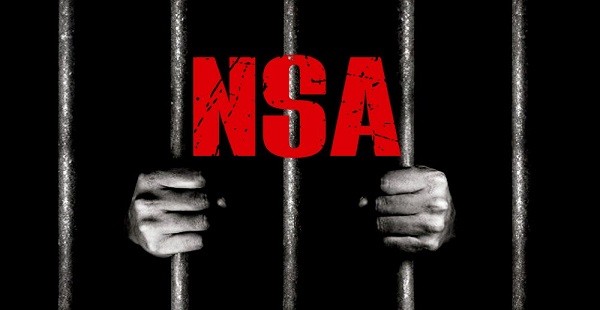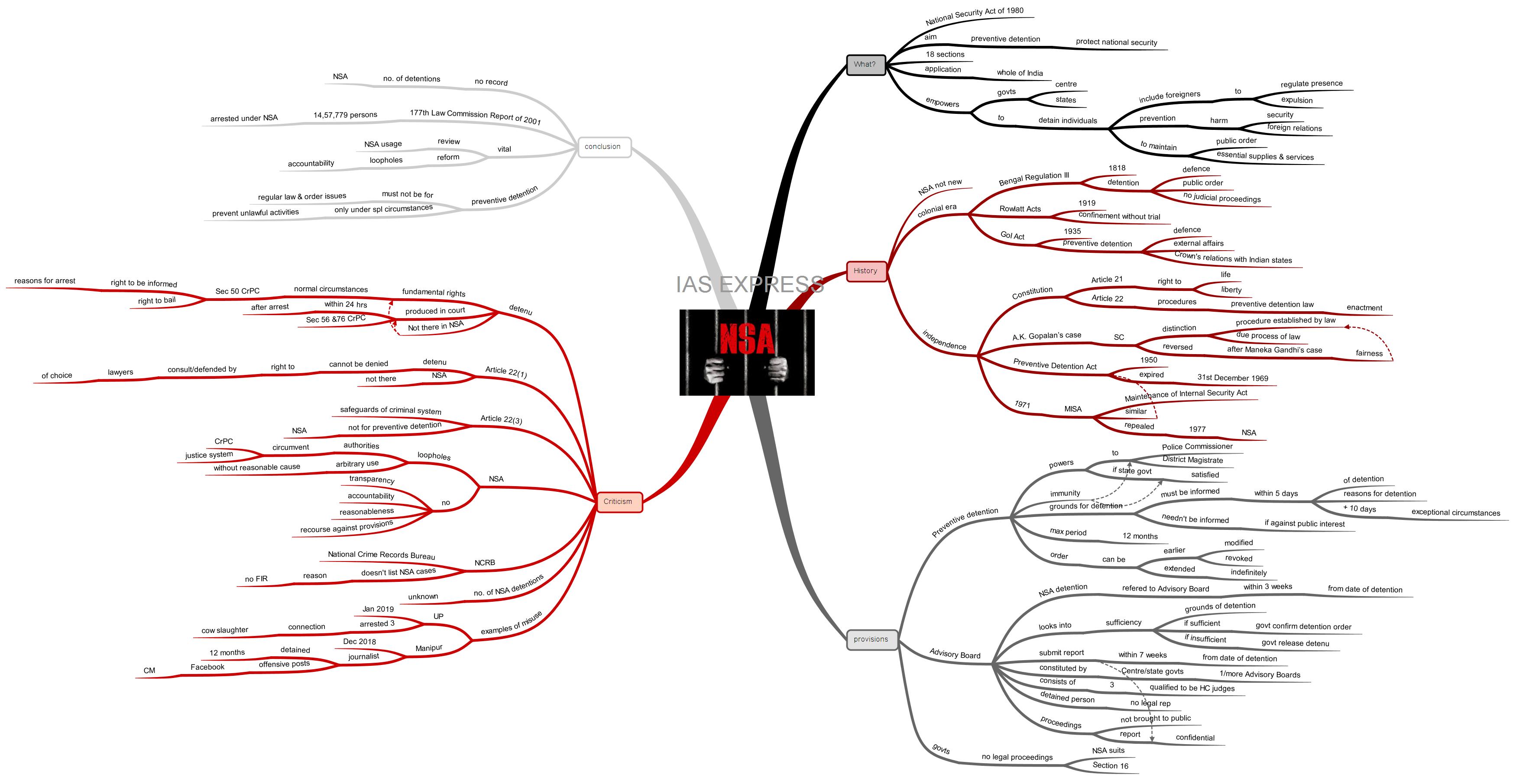National Security Act (NSA), 1980 – Why is it Criticised?

With the growing instances of attacks on healthcare workers and police officers, who are engaged in tracking and treating patients suffering from COVID-19, at least two states, Uttar Pradesh and Madhya Pradesh have booked offenders under the National Security Act. Though the invocation of the National Security Act is necessary under these circumstances, changes must be made so that this law is not exploited by the authorities due to the loopholes that exist within its provisions.
What is the National Security Act, 1980?
- The National Security Act of 1980 is a law that aims to provide for preventive detention in certain cases that can pose a threat to the security of the country.
- This Act, consisting of 18 sections, applies to the whole of India.
- It empowers the Central Government and state governments to detain an individual to prevent him/her from acting in any manner that may hurt India’s security, its relations with foreign countries, for the maintenance of public order, or the maintenance of supplies and services essential to the community.
- The law also gives power to the governments to detain foreign nationals to regulate his/her presence or expel from the country.
How did National Security Act come to be?
- The National Security Act is not the first law of its kind to be enacted in India.
- Preventive detention laws in India date back to early days of the colonial era when the Bengal Regulation III of 1818 was enacted to empower the government to arrest anyone for defence or maintenance of public order without giving the person the judicial proceedings.
- A century later, the British government enacted the Rowlatt Acts of 1919 that allowed confinement of a suspect without trial.
- The Rowlatt Acts empowered the state to detain citizens without giving detainee any right to move to the court and even get the assistance of lawyers.
- Jallianwalla Bagh tragedy was a direct result of the protest against these Rowlatt Bills.
- The Government of India Act, 1935 empowered the state to undertake preventive detention for reasons related to defence, external affairs or discharge of functions of the Crown in its relations with the Indian States.
- After the enactment of the Indian Constitution, Article 21 guaranteed every individual the right to life and liberty, which could not be denied to him/her without honouring the due procedure established by law.
- In K. Gopalan’s case, the Supreme Court distinguished “the procedure established by law” from the “due process of law”, saying that any procedure duly enacted would be a “procedure established by law”.
- However, this view currently stands reversed after Maneka Gandhi’s case where the top court held that the “procedure established by law” must also be just, fair and reasonable.
- Article 22 of the Indian constitution laid down procedures under which a preventive detention law could be enacted.
- After independence, India got is the first preventive detention rule when the Nehru Government enacted the Preventive Detention Act of 1950, which expired on 31st December 1969.
- In the year 1971, Prime Minister Indira Gandhi had brought in the controversial Maintenance of Internal Security Act (MISA), giving similar powers to the government.
- Later, the MISA was repealed in 1977 and was replaced by the National Security Act (NSA).
What are the provisions of NSA?
Detention:
- The power to preventively detain an individual under the National Security Act is given to the Police Commissioner or District Magistrate if the state government is satisfied that it is “necessary to do so”.
- The Act provides that a detained individual have to be informed of the grounds of detention within 5 days of detention, which may extend up to 10 days in exceptional circumstances.
- At the same time, the Act also states that the authority has the right to not disclose the facts, which it deems to be against the public interest to disclose.
- The maximum permissible period of detention under the NSA is 12 months.
- However, the order for preventive detention can be modified or revoked any time earlier or can be extended indefinitely beyond 12 months.
Grounds of Detention:
- An individual can be detained under the NSA in the presence of the following grounds:
- Acting in a manner prejudicial to India’s defence, foreign relations or security
- Regulating the continued presence of any foreigner in India or to make arrangements for his expulsion from India
- To maintain public order
- To maintain supplies and services that are essential to the community
Constitution of Advisory Board:
- Under the NSA, if any detention is made, then it has to be referred to an Advisory Board within three weeks from the date of detention.
- This Advisory Board has to submit its report within 7 weeks from the date of detention.
- The Central or State government shall constitute one or more Advisory Boards.
- An Advisory Board consists of 3 persons who are qualified to be appointed as judges for the High Courts
- Here, the detained person does not have the right to be legally represented.
- Also, the board proceedings are not brought to the public and the reports are confidential.
- The Advisory Board analyses whether or not the grounds of detention is sufficient or not.
- If the Advisory Board finds that the grounds are sufficient, then the appropriate government may confirm the order for detention.
- However, if the Advisory Board finds no appropriate grounds to permit detention, the government should release the detenu.
No legal proceedings against governments:
- Section 16 states that no suit or other legal proceedings can be taken against Central or State governments, or any other person, for anything that is being done in good faith or intended to be done in pursuance of this Act.
Why is NSA criticised?
- Under the normal circumstances, if an individual is arrested, he/she is guaranteed certain fundamental rights.
- These include the right to be informed of the reasons behind the arrest.
- Section 50 of the Criminal Procedure (CrPC) mandates that the arrested individual should be informed of the grounds of arrest and the rights to bail.
- Sections 56 and 76 of the CrPC also provide that an individual has been produced before a court within 24 hours of arrest.
- Furthermore, Article 22(1) of the Constitution states that an arrested person cannot be denied the right to consult and to be defended by a legal practitioner of his/her choice.
- However, none of these aforementioned rights is allowed under the NSA.
- Article 22(3) of the Constitution does not extend the safeguards of the criminal system to preventive detention.
- NSA provides major loopholes for the government and the police to circumvent the formalities of the Criminal Procedure Code and the justice system.
- This Act provides neither transparency nor accountability of the government.
- Furthermore, the National Crime Records Bureau (NCRB), which collects data pertaining to crime in India, doesn’t list out the cases under the NSA as no FIRs are registered in this regard. This makes it impossible to know the exact number of detentions that have been made under this Act.
- These limitations allow the government to use the law arbitrarily and without any reasonable cause.
- Some of the instances of government misusing this NSA include:
- Uttar Pradesh government, in January 2019, arrested three individuals under the NSA in connection with alleged cow slaughter.
- In December 2018, a journalist from Manipur was detained for 12 months under the NSA, where he has posted an offensive post against the Chief Minister on Facebook
- Though this Act provides for maintenance of law and order within the country, it lacks reasonableness.
- Currently, there is no recourse available against these provisions, allowing for the ignorance of basic human rights for the detained persons.
Conclusion:
Currently, there is no separate record on the number of detentions under the NSA. The 177th Law Commission Report of 2001 disclosed that 14,57,779 persons are arrested under the preventive provisions of India. It is vital to review the continued usage of the NSA and to ensure that the reforms are made to close the loopholes so that the authorities are accountable to the public for detaining the individuals. Preventive detention must not be used for regular law and order issues but should be used under special circumstance to prevent unlawful activities from taking place.
Practice question for mains:
Critically examine the provisions of the National Security Act, 1980. What are the changes that need to be made to ensure that it is on par with India’s democratic principles? (250 words)
If you like this post, please share your feedback in the comments section below so that we will upload more posts like this.


